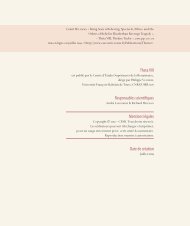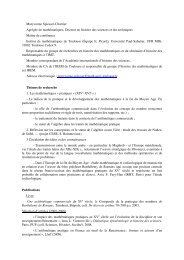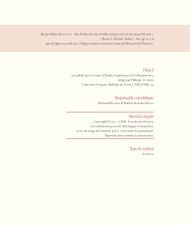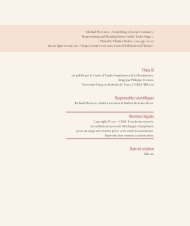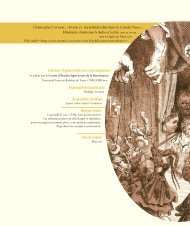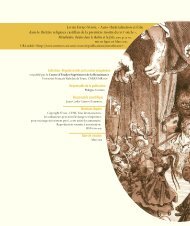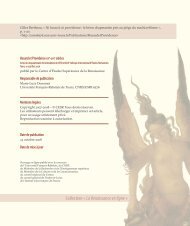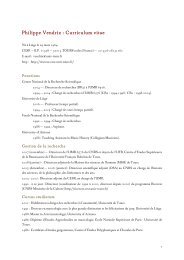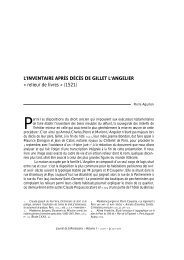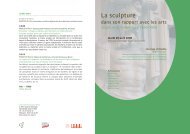Theta IX Responsables scientifiques Mentions légales Date de ...
Theta IX Responsables scientifiques Mentions légales Date de ...
Theta IX Responsables scientifiques Mentions légales Date de ...
Create successful ePaper yourself
Turn your PDF publications into a flip-book with our unique Google optimized e-Paper software.
ing figures for the nation. Respublica may appear on stage as a noble and educatedvirtuous lady, John as a forthright member of the common people. Butwe should not take them as representing or personifying these restricted sociali<strong>de</strong>ntities. They are offered as figures for a much broa<strong>de</strong>r sense of national i<strong>de</strong>ntity,although their particular theatrical characterisations certainly tacitly enactvarying assumptions by the authors about how such national i<strong>de</strong>ntity might becharacterised and un<strong>de</strong>rstood.Another dominant strand of sixteenth-century discussion of commonwealaddresses the social and economic problems which beset society. 9 The prosperityof the commonweal is envisaged importantly in economic terms, although theseare generally un<strong>de</strong>rstood as inseparable from moral and religious concerns. Issuesof poverty, and those of productivity, tra<strong>de</strong> and taxation dominated. Anxiety wasdirected not only toward the absolute poverty of the common people but to therelative <strong>de</strong>pression of landowners, merchants and craftsmen, and to the consequentdifficulties in supporting the functioning of the realm and the wealth andwelfare of its inhabitants. In the mid-century there is increasing <strong>de</strong>bate aboutsocial and economic processes, and the relative responsibilities of the crown, thenobility, the church and the merchants in promoting employment and prosperityand alleviating distress. Discussion of commonwealth is dominated by suchsocial and economic concerns.These issues are crucial in both of these plays. They are not presented asplays about social and economic hardship, but rather about wi<strong>de</strong>r-reaching issuesof government, church and state. But poverty and social welfare are pointedlydramatised as providing an in<strong>de</strong>x of the state of the commonweal: the hardshipsuffered by the common people is vividly presented in both plays, through thetragicomic figures and complaints of People and the Poor Man. So, in Respublica,People complains of the exorbitant prices of basic commodities, while Avarice<strong>de</strong>lights in his corrupt <strong>de</strong>aling with leases and rents, benefices and bribes, theappropriation of church property, sale of counterfeit goods and the export of“grayne, bell meatall, tynne and lead” (l. 8). Many of these were issues flaggedup by Mary’s Privy Council at the beginning of her reign as requiring immediateattention. 10 In the Thrie Estaitis, the Poor Man, supported by John the Common-Weill, draws attention to the problem of work-refusers in all classes, the unequal9 The following discussion draws on Jones, chaps. and (pp. -3).10 See the “Remembraunce of thynges worthie examinacon for the quenes maiestie”; also Walker,pp. -84.Dramatising I<strong>de</strong>ology …theta iX 103



